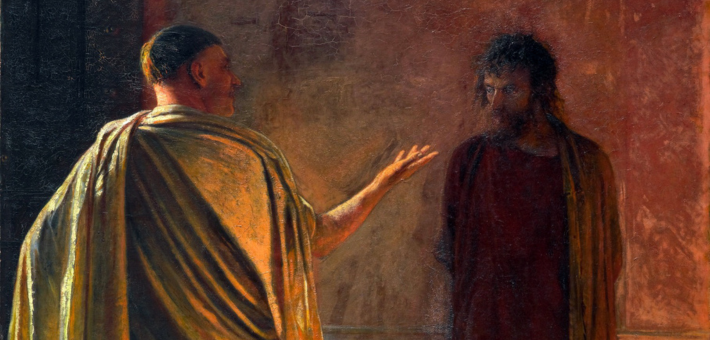Commentary on Daniel 7:9-10, 13-14
“In the first year of King Belshazzar of Babylon, Daniel had a dream and visions of his head as he lay in bed. Then he wrote down the dream …”
So begins Daniel 7, which marks the transition in the book from court stories that celebrate heroic faithfulness and portray God’s judgment on royal hubris to the apocalyptic half of the book, which represents kings and kingdoms as “great beasts.” In the story world, these empires are envisioned as ruling the known world after Daniel’s time. But by the time the story was composed, all but one of the empires described had risen and fallen, and thus Daniel’s visions of the future were, for the author, prophecy after the fact.
The Babylonian, Median, and Persian empires had come and gone, and the Greek empire of Alexander had divided into regional factions, including the Seleucid Empire founded by Seleucus I. The author and his intended audience lived in Judea, a region ruled by the Seleucid king Antiochus IV “Epiphanes.” The epithet [theos] epiphanes means [God] manifest, a title that Antiochus had minted on his royal coinage.
In 168 BCE Antiochus responded to turmoil among the Jewish leadership in Jerusalem with crushing power. He essentially outlawed the Jewish religion, desecrated the Jerusalem temple, and slaughtered those who resisted his imposition of Hellenistic religious symbols, festivals, and practices.
Daniel portrays the Seleucid Empire as a “terrifying and dreadful and exceedingly strong” beast with “great iron teeth.” It was “devouring, breaking in pieces, and stamping what was left with its feet” (verse 7). On its head were ten horns, probably representing Seleucid rulers, three of whom were displaced by a little horn.
There were eyes like human eyes in this horn, and a mouth speaking arrogantly. … He shall speak words against the Most High, shall wear out the holy ones of the Most High, and shall attempt to change the sacred seasons and the law; and they shall be given into his power for a time, two times, and half a time (verses 8, 25).
Antiochus is the arrogant horn who caused three other horns to be plucked up, a reference to the fact that he came to power by usurpation and ruled in a manner that was indeed arrogant, as well as capricious and frequently brutal. The Jews suffered horrifying oppression under him (as described in the books of Maccabees). In 167 BCE, under the leadership of Judas Maccabeus and his family, many of the Jews revolted and successfully drove Antiochus’s forces from Jerusalem. Control of Jerusalem and Judea shifted back and forth in skirmishes for several decades, but the Judeans eventually won a degree of autonomy that persisted into the time of Jesus.
Daniel’s vision of judgment
Daniel 7–12 portrays the downfall of the Seleucid Empire and judgment of Antiochus in a series of vision accounts. Daniel 7 is the most arresting and dramatic of these. In it, the divine court is set up, probably on earth rather than in heaven, and judgment is passed on the four beast-empires. The fourth empire, and specifically Antiochus, is judged and destroyed with fire.
On Christ the King Sunday, our attention is focused on this judgment scene. We see the Ancient One seated on a central throne with a myriad of servants attending him. Physical descriptions of God are few in the Hebrew Bible, presumably in keeping with the Torah’s prohibition of representing God with mundane images.
Here, the author describes only God’s garment and hair, although his sitting on a throne implies also a human-like form. The description of God’s throne almost certainly draws on Ezekiel’s vision of “the appearance of the likeness of the glory of the LORD” (Ezekiel 1). God’s throne has wheels and is ablaze with fire. Daniel adds to Ezekiel’s description that a stream of fire flows from the throne. The depiction of God communicates God’s otherness and extreme danger: “Our God is a consuming fire” (Hebrews 12:29).
Earthly sovereigns, by contrast, are mere beasts that “devour and break in pieces” for a limited time, but the divine fire may devour them in the end. Antiochus is judged, not only for his violence and oppression against God’s people but also for his arrogance (verses 8, 11). Punishment of the arrogance of the kings is a theme in the first half of the book of Daniel, especially in chapters 4 and 5.
Following the judgment of the four empires and destruction of Antiochus, Daniel sees “one like a human being [literally, son of a human] coming with the clouds of heaven.” Christians, following the Gospels, quite naturally interpret this figure as Christ the King, the Messiah who comes on the clouds of heaven to rule the earth forever. Indeed, Jesus frequently refers to himself as “Son of Man,” and in his trial he quotes Daniel 7:13–14, causing the high priest to tear his clothes and declare blasphemy (Matthew 26:64; see also Matthew 16:27; 19:28; 24:30; 25:31).
Of course, the author had another in mind, possibly an unnamed messianic figure, or the angel Michael, Israel’s defender, or even God’s people collectively. In Daniel 7:18, 22, 25, and 27, the kingdom is given not to an individual but to “the holy ones of the Most High.” In contrast to the beasts who violently assert their power, the one like a human being is presented before God and “given dominion and glory and kingship.” He rules by God’s appointment, not by his own self-assertion and violence.
Christians, especially those hearing this text on Christ the King Sunday, will naturally assume the author foretells God’s appointment of Jesus as the everlasting Messiah. Perhaps we need not choose between original intention and later application. One can hold that the author establishes a prophetic paradigm that has one fulfillment in the author’s time and another, later and ultimate one in Jesus.
The main point to be made in preaching this text is that God is sovereign over history. Rulers come and go. They rage and destroy and boast arrogantly, even declaring themselves “God Manifest.” But in the end the books will be opened and the truth told. Boasting will come to an end, and all will acknowledge God’s sovereignty. The “one like a human being,” God’s chosen, will then rule forever, served and honored by all people. The oppression and the arrogance of rulers has its day, but in the end God’s Messiah will rule on earth, and every knee shall bow. To him alone are the power and the glory, and he alone deserves our ultimate allegiance.


November 24, 2024